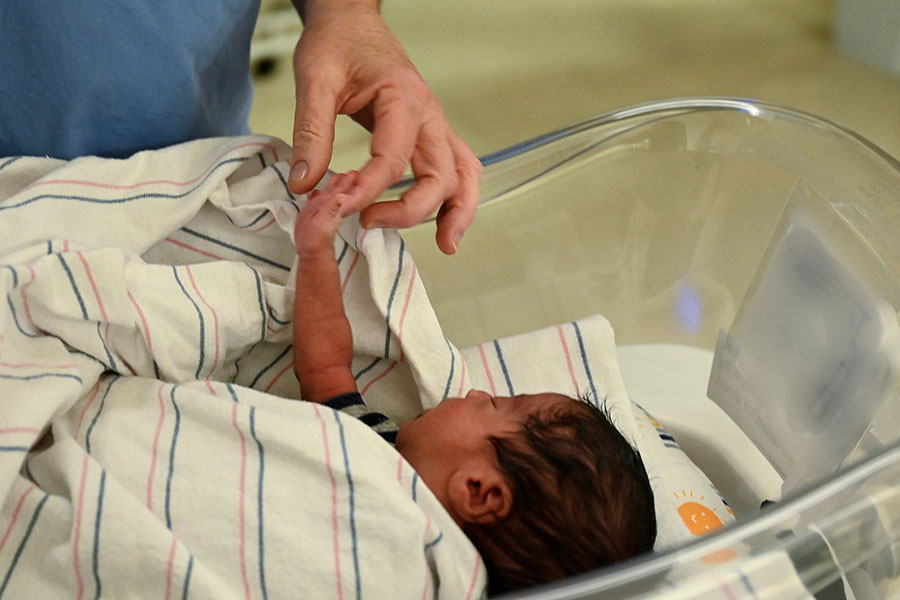A New Day for Mothers & Babies

Welcome to the Level III Neonatal Intensive Care Unit (NICU) at Temple Women & Families, also known as the Infant Intensive Care Nursery (IICN). Our newly designed, state-of-the-art 42-bed NICU reflects Temple Health’s commitment to delivering specialized care for premature babies and high-risk newborns. Staffed by an experienced, compassionate NICU team of nurses, doctors, respiratory therapists, and support personnel, our facility features the latest technology and personalized services to ensure every baby gets the best possible start in life.
Each year, our Temple NICU provides advanced neonatal care to approximately 400 babies—some born as early as 23 weeks of pregnancy and weighing as little as 12 ounces. Many of these infants require additional support for conditions such as respiratory distress, cardiac issues, or feeding and neurologic complications. Our Temple Health NICU also accepts newborns from the regular nursery who develop issues requiring a higher level of care.
Thanks to a multidisciplinary approach and evidence-based treatments, our NICU surpasses national benchmarks for critically ill newborn outcomes. We continually engage in research to further enhance quality of care and improve infant survival and growth.
A Specialized Focus on Women & Families
As the only campus in the Philadelphia area exclusively dedicated to women’s and families’ health, Temple Women & Families emphasizes pre- and postnatal care, helping to ensure healthier pregnancies and positive outcomes for both mothers and babies. Whether you need emotional support, help with breastfeeding, or specialized therapies, we’re here every step of the way.
Personalized Care & Team Approach
Conditions We Treat
Our Level III NICU is equipped to address a wide range of issues common to high-risk newborns and premature infants, including:
- Respiratory Distress Syndrome (RDS): Babies may need surfactant and advanced respiratory support for underdeveloped lungs.
- Pneumonia: Treatment for lung infections present at birth or acquired soon after.
- Sepsis & Other Infections: Comprehensive monitoring and care for blood infections.
- Hypoglycemia: Management of low blood sugar levels critical to newborn development.
Since Temple is a Center of Excellence for opioid use disorder, our NICU team collaborates with physicians from the TRUST Clinic. We provide a welcoming, nonjudgmental approach to care for parents facing opioid use disorder and their babies.
Our Team Approach
When your baby requires a stay at the Temple Health NICU, you benefit from a robust network of experts working collaboratively to meet every aspect of your infant’s needs. This includes:
- Physician Neonatologists (newborn intensive care specialists)
- Neonatal Physician Assistants
- Neonatal Nurses (many with decades of NICU experience)
- Respiratory Therapists
- Social Workers
- Nutritionists
- Unit Clerks
Working together, we deliver specialized care and continuous support from the moment you arrive.
Our Commitment to You
Our NICU services are part of the broader, comprehensive maternity care offerings at Temple Women & Families, which include private rooms, labor and delivery services, high-risk antepartum beds, postpartum care, radiology, and expanded maternal health support. We strive to meet the growing demand for excellent clinical services and exceptional outcomes through equitable, accessible care and evidence-based practices.
Caring for Your NICU Baby: A Parent’s Primer
Skin-to-Skin Contact
We encourage kangaroo care, or skin-to-skin contact, because research shows it benefits your baby’s immunity, lowers stress, improves sleep, and supports breastfeeding. Our family-centered approach ensures you can spend meaningful time bonding with your baby while they receive the medical support they need.
NICU Reading Program
Language exposure is crucial for optimal brain development, especially for NICU infants who may be separated from parents. Our reading program encourages parents to read and sing to their babies, helping to develop vital neural pathways for social, emotional, and linguistic growth. We also recommend massage therapy when medically appropriate.
Additional Support Services
We know that postpartum counseling and support are essential for long-term success. Along with lactation services and kangaroo care, we offer:
- Nutritional Support – Ensuring your baby receives the nutrients necessary to thrive.
- Primary Nursing – 24/7 specialized nursing care.
- Ophthalmology – Eye specialists on site to assess your baby’s vision.
- Speech Therapy – Helping babies develop early feeding and communication skills.
- Physical Therapy – Evaluating and supporting movement needs common in premature babies.
- Infant CPR Care – Teaching lifesaving techniques for emergencies.
- Scrapbook Journaling – A supportive practice for tracking your baby’s NICU journey.
Should you need additional resources, we can connect you with local family support groups and offer chaplain services for spiritual care.
Newborn Care Beyond The NICU: Our Ongoing Support
Before discharge, our team ensures you’re fully equipped with the knowledge and confidence to care for your baby at home. We continue to check in with you after you leave, answering any questions that might arise.
If your baby has highly complex medical needs, follow-up care is available through the Next Steps Clinic, in affiliation with St. Christopher’s Hospital for Children. We can also help you set up your baby’s first pediatric appointment if you don’t already have one.
Our goal is to empower you with the skills, tools, and family-centered support to thrive well beyond your NICU stay. At Temple Women & Families, we remain dedicated to providing a bright and healthy future for your family.
Learn more about Obstetrics/Maternity Care at Temple Women & Families »